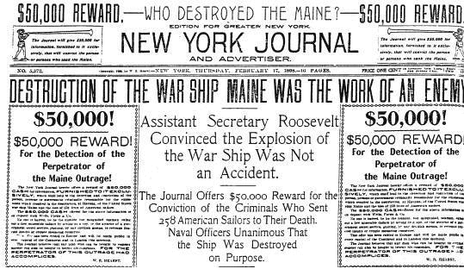Yellow press
(press, journalism) | |
|---|---|
 | |
Yellow journalism, and yellow press are American terms for journalism and associated newspapers that present little or no legitimate, well-researched news while instead using eye-catching headlines, lurid features and sensationalized content for increased sales. The phrase was coined in the 1890s to describe the tactics employed in the furious competition between two New York City newspapers, the World and the Journal.[1]
In English, the term is chiefly used in the U.S. In the UK, a roughly equivalent term is tabloid journalism, meaning journalism characteristic of tabloid newspapers, even if found elsewhere. Other languages, e.g. Russian, sometimes have terms derived from the American term. A common source of such writing is called checkbook journalism, which is the controversial practice of news reporters paying sources for their information without verifying its truth or accuracy.
In some countries it is considered unethical by corporate media outlets. In contrast, tabloid newspapers and tabloid television shows, which rely more on sensationalism, regularly engage in the practice.
An example
| Page name | Description |
|---|---|
| The Sun | A UK tabloid |
Related Quotation
| Page | Quote | Author | Date |
|---|---|---|---|
| Kit Klarenberg | “Under obvious pressure from the British natsec state and its media lackeys, the UK’s National Union of Journalists has deleted its statement of concern about @KitKlarenberg’s detention by counter-terror police. Kit was interrogated almost exclusively about his factual reporting.” | Kit Klarenberg Max Blumenthal | 3 June 2023 |